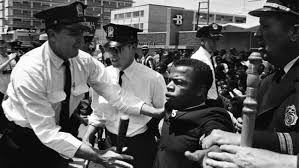 John Lewis: Religious Leader, Civil Rights Activist, American Icon We have experienced more in the last four months than we have in the last 20 years in the United States: an ongoing global pandemic, spotlighting of social injustices and racial inequities, health disparities and politicized everything and anything – all wrapped up in the package of a divided nation, unable to truly live up to its own ideal of being united. Kicking and screaming, we have been thrust into a reckoning which is forcing us to dismantle a dysfunctional system and construct a just society to save us from ourselves. One of the most recent bookends of this reckoning is the passing of Representative John Lewis on Friday, July 17, 2020. For America, his passing highlighted his perpetual, decades-long stance for racial justice. John Lewis was that rare breed of human who moves us to think in ways that serve all of humanity with equity and love. John Lewis’ every action was a clear statement of his morals, values, and Christian faith – each in lockstep with the other. He moved us to examine our moral lives, embrace humanity, love one another, think beyond ourselves, and do what is right by standing up for justice wherever it is absent. With every cell in his body, he believed that we each have a moral obligation to do so. Born in Alabama in 1940, John Lewis grew up at a time when Jim Crow laws legalized racial segregation and ministers were commonly leading members of the Black community. As a boy, John spent many of his days emulating those ministers by preaching to the chickens in the yard of his home in rural Alabama. Later, inspired by the oratory and leadership of the Rev. Martin Luther King, Jr. and then following in his footsteps, John went on to become a civil rights activist while attending American Baptist Theological Seminary in Tennessee. He demonstrated courageous leadership by calling out injustice amidst the silence of others and paying for his bravery with multiple beatings, threats, arrests, imprisonment, and his own blood, sweat and tears. From Alabama to the March on Washington, from the Student Nonviolent Coordinating Committee to the United States Congress, activism fueled by religion guided John Lewis’ life. He believed that civil rights activism and faith were intertwined. “The Civil Rights Movement was based on faith. Many of us who were participants in this movement saw our involvement as an extension of our faith. We saw ourselves doing the work of the Almighty. Segregation and racial discrimination were not in keeping with our faith, so we had to do something.” John Lewis sacrificed himself for the movement of racial justice and freedom, living an exemplary life, ordained by God. At All Saints’ Church, we admire, honor, and thank John Lewis for his service to this country, his sacrifice of self, and his love for all people. May we follow John Lewis’ example and answer his moral mandate of standing up for justice wherever it is absent. Joy De Lancy
0 Comments
Leave a Reply. |
Archives
August 2020
Categories |
 RSS Feed
RSS Feed